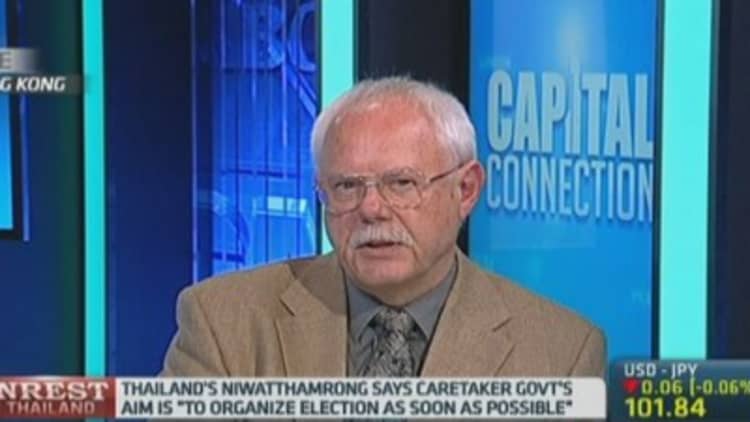Just as a crisis in Ukraine shows signs of abating, geopolitical tensions in Asia have resurfaced, knocking Vietnam stocks down over 5 percent on Thursday.
Vietnam said on Wednesday that a Chinese vessel intentionally rammed two of its ships in an area of the disputed South China Sea where China has deployed an oil rig.
Against this backdrop, Vietnam's benchmark stock index slid over 5 percent Thursday to its lowest level in almost four months.
"One theory is that the Chinese are trying to put a bit of pressure on Vietnam to come to a compromise in terms of who is able to access mineral rights in the region," said Kevin Snowball, CEO, at PXP Vietnam Asset Management, an investment manager that concentrates on equity investment in Vietnam.
"It is sabre rattling; do we think it will go further? I hope not, but domestically it is certainly causing some concern," he added.
China's vice foreign minister said on Thursday that he believes China and Vietnam can solve their disputes peacefully, adding that China has to defend its territory, Reuters reported.
Separately, Beijing has demanded that the Philippines releases a Chinese fishing boat and its crew that were seized on Tuesday off the Spratly Islands in the South China sea.
In addition to rival claims in the South China Sea from China, Vietnam, the Philippines, Taiwan, Malaysia and Brunei, China and Japan are engaged in a territorial dispute in the East China Sea.
Read MoreUS respondsto South China Sea incident
"What we're seeing in the South China Sea at the moment is pretty relevant," Timothy Riddell, head of global markets research for Asia at ANZ Bank, told CNBC's "Street Signs Asia"
"The Philippines and Vietnam have got issues about territorial rights to seas around disputed islands and that's important because of the mining and fishing rights that go with it," he said, adding: "This is going to become more acute as the regional countries grow."

China, the biggest regional economic power and the world's number two economy, has become more assertive about its rights in the region, alarming its neighbors.
And the latest flare up in tensions comes just days after U.S. President Barack Obama visited Asia to reassure allies such as Japan and the Philippines.
Read MoreObama reassures ally Japan
It also keeps geopolitical risk at the forefront for global markets just when sentiment received a boost on Wednesday after Russian President Vladimir Putin urged pro-Moscow separatists in Ukraine to postpone a vote on secession.
"What is interesting is that this theme of geopolitical tensions, which we are seeing globally and Ukraine is a good example of that, is something markets are aware of," said Hamish Pepper, forex strategist for Asia at Barclays. "To the extent that we do see geopolitical tensions rise for whatever reason that is a catalyst for risk aversion."
Still, analysts said the impact on developed markets from geopolitical tensions Asia was probably likely to be limited for now.
"Traders and markets will always keep an eye on the South China Seas but developed markets realize the chances of something significant happening are low for now," said Chris Weston, chief market strategist at IG in Melbourne.
Read MoreOilprice.com: China tries drilling into 'Roof of the World'
While Vietnam stocks tumbled on Thursday, the benchmark Shanghai Composite gained 1 percent as investors focused on stronger-than-expected China trade data.


